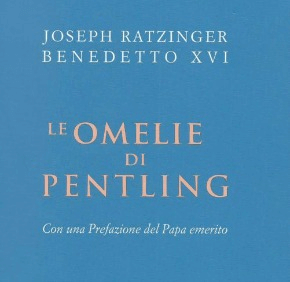By Carol Glatz
Catholic News Service
VATICAN CITY – The god of Mammon, who is “like a wild animal, trying to clutch me with his talons and enslave me,” and people not open to the Holy Spirit, who “are like swamps that give off foul-smelling gases,” are just a few of the analogies that appear in the latest collection of papal homilies.
Rigid doctors of the law “imagine God as a kind of really strict school teacher who assigned humanity homework that only very few are able to do. For the majority, the notebook of life will be handed back with the grade: ‘Poor!'”
If it sounds like the usual fare from Pope Francis, it is strongly similar, but the author in this case was Cardinal Joseph Ratzinger, the future Pope Benedict XVI.
Never-before published, the 10 homilies are informal, colorful, off-the-cuff reflections that seek to make the mystery, relevance and force of the faith clear and inspirational to everyday Catholics in a small Bavarian parish. The 100-page book – currently available only in Italian – is titled, “The Homilies of Pentling,” the German village where the cardinal vacationed and kept a home he had hoped to retire to one day.
“Apart from a few small corrections, I kept the familiar style of the text just as it flowed out back then,” the retired pope wrote in the book’s preface. He said he hoped the homilies, taken from transcribed audio recordings between 1986 and 1999, would help not just “my fellow citizens of Pentling,” but all readers in “understanding and living the word of the Gospel.”
While Pope Francis consistently crafts clever, memorable metaphors in his writings and talks, many people don’t remember that Pope Benedict was quite good at it, too.
The former professor and pre-eminent theologian had that same teacher-talent of being able to present or explain complex concepts clearly and simply. But perhaps because so many of his encounters were more formal, scripted affairs, his gift of warm, informal instruction found few outlets in his busy pontificate – the best ones being rare Q&A sessions, especially with children.
One young boy, who had recently celebrated his first Communion, once asked Pope Benedict how Jesus was really present in the Eucharist when “I can’t even see him.”
With a polite laugh, the pope smiled and explained that there were lots of important things that exist even though they cannot be seen. For example, electricity is invisible, but people know it is there because “we see the light” it produces – people can see its effects, the pope said during a festive ceremony featuring clowns and stilt-walkers in St. Peter’s Square in 2005.
And just as people cannot see Jesus with their eyes, they can see him through what he affects.
“We see that where Jesus is, people change, they become better,” he said.
When preaching to his fellow German village parishioners, he showed he understood most of the world did not understand Christ’s real presence, either. God truly came down to dwell among people, he said in a homily from 1991, “to become accessible to us, to become a God for us. He became a God at your fingertips, a God who puts himself in our hands.”
But “what is our reaction? If all of a sudden today talk got out or news spread that there was someplace people could see God, that you could go straight to him, imagine the flow of tourists that would be set in motion, think how much the media would follow this event.”
But despite being always present, “silently and without making a racket, in the divinely simple and loving way he really is,” he said, “our response in great measure is indifference. Churches are empty and even the disciples leave.”
Then-Cardinal Ratzinger, who was in Rome as prefect of the Congregation for the Doctrine of the Faith, touched on many of the same themes Pope Francis has made central to his pontificate, as both popes’ teachings are so rooted in Scripture.
On the need for a church that is open to the vitality of the Holy Spirit, then-Cardinal Ratzinger said in a homily in 1987, “A church community that closes up inside itself saying, ‘It’s so nice here, just us, we understand each other so well that all the other things that come from Rome or elsewhere bother us so that’s that,’ – such a community would collapse upon itself and shrivel up. It wouldn’t have any more life force.”
He spoke of how pride and a kind of laziness can lead to self-righteousness, which pushes people further from God as they push others more forcefully toward human judgment: “It is none of our business, so to speak, to check on God’s bookkeeping, to take hold of his accounting ledgers, to outguess his thinking. … The task of deciding the destiny of other people has not been entrusted to us. We are before him and we need to have him look at us and allow him to address us. The others are in his hands.”
Making the life, teaching and words of Jesus universally clear to everyone was a hallmark of his pontificate and the focus of a village homily from 1999.
Reflecting on the keys to the kingdom of heaven Jesus gives Peter, the future pope said Jesus rebuked those “who use the keys badly, who, with their specialist knowledge, complicate sacred Scripture so much that no one knows what it actually says anymore.”
Having the keys “means that you have to unlock it so that it becomes understandable, so that it becomes the path of life,” he said – a sign he saw his whole life’s ministry to teach and preach with clarity, and sometimes a splash of color, to help people discover “the word of God truly points out the way.”
Also see:
Church’s credibility found in showing mercy, Pope Francis says in new book


